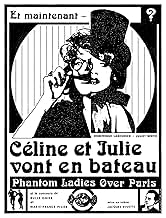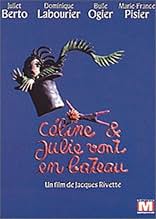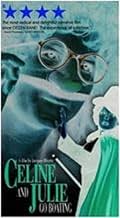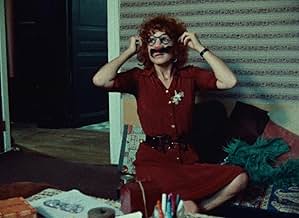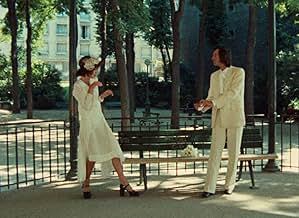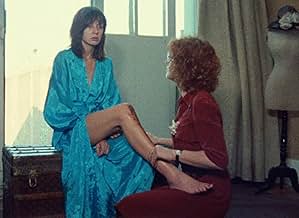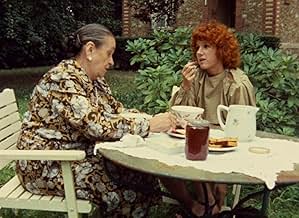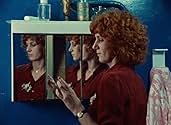Céline und Julie fahren Boot
Originaltitel: Céline et Julie vont en bateau : Phantom Ladies Over Paris
IMDb-BEWERTUNG
7,2/10
6824
IHRE BEWERTUNG
Ein geheimnisvoll verbundenes Paar junger Frauen findet ihren Alltag durch ein seltsames Boudoir-Melodrama vorweggenommen, das sich in einer halluzinatorischen Parallelrealität abspielt.Ein geheimnisvoll verbundenes Paar junger Frauen findet ihren Alltag durch ein seltsames Boudoir-Melodrama vorweggenommen, das sich in einer halluzinatorischen Parallelrealität abspielt.Ein geheimnisvoll verbundenes Paar junger Frauen findet ihren Alltag durch ein seltsames Boudoir-Melodrama vorweggenommen, das sich in einer halluzinatorischen Parallelrealität abspielt.
- Auszeichnungen
- 1 wins total
Jean-Claude Biette
- Spectateur au cabaret
- (Nicht genannt)
Jacques Bontemps
- Lecteur à la bibliothèque
- (Nicht genannt)
Michel Caen
- Spectateur au cabaret
- (Nicht genannt)
Empfohlene Bewertungen
When I first saw this film I was amazed by it. The freshness and the imagination of the two protagonists, the way in which it recognised the magic (real magic) of Paris, and the strange parallel worlds it created in which Celine and Julie are both deeply involved and creating, and then acting, their own parts. On re-viewing it more than ten years later though, I was surprised to be a little disappointed. The magic is so thin. Celine and Julie have taken the, very conscious and explicit, decision not to grow up, and as a result, although they are beautiful adults, their world is a child's world. Their imagination is child-like, in its imagery (sweets, plastic "dinosaur eyes", rather thin puns), in its chosen surroundings (cases full of dolls), its disasters (a grazed knee), its aims (largely disruption of the concerns of surrounding adults), in its ridiculing of sexuality and its steadfast refusal to admit that fantasy is sometimes, necessarily, dangerous. Without any danger or any desperation, it seemed on second visit a charming but slightly futile game.
10Corwin-3
Movies would seem to be the ideal medium for surrealism, yet there are almost no good surrealist movies. There is the venerable "Un Chien Andalou", and there is "Celine et Julie vont en Bateau", and that might well be the lot. "Celine et Julie" has been one of my favorite films since I first saw it in the 1970s, because it is hypnotic, thought-provoking, mysterious, and funny, all at once. Its overall style could be described as magical realism, in which the quotidian life of Paris serves as a mere background for the magical fantasy life of the protagonists, two young women on a psychic journey, which may or may not end in madness ("vont en bateau", which literally means "go boating", is also slang for "go crazy").
The film is made of moments that seem to happen outside of time. In fact, the passage of time, the succession of events in everyday life, becomes an intrusion on the increasingly shared inner life of the two women, and each takes (hilarious) action to prevent those intrusions from continuing. They determine, in effect, that they must return as adults to their childhood in order to change the past. This may sound like a boring Freudian nightmare, but there is no heavy-handed psychologizing in the movie; it is all play, lighthearted yet beautifully composed. The sound-track is particularly effective, almost hyperrealistic, with no background music. The click of heels on pavement, or the motor of a taxi, loom out of the silence as in a dream, which the movie may be, at its heart.
I give this one a 10. You probably know already whether you would like it. If so, see it in a theater if you can, and on video if you must, but don't miss it.
The film is made of moments that seem to happen outside of time. In fact, the passage of time, the succession of events in everyday life, becomes an intrusion on the increasingly shared inner life of the two women, and each takes (hilarious) action to prevent those intrusions from continuing. They determine, in effect, that they must return as adults to their childhood in order to change the past. This may sound like a boring Freudian nightmare, but there is no heavy-handed psychologizing in the movie; it is all play, lighthearted yet beautifully composed. The sound-track is particularly effective, almost hyperrealistic, with no background music. The click of heels on pavement, or the motor of a taxi, loom out of the silence as in a dream, which the movie may be, at its heart.
I give this one a 10. You probably know already whether you would like it. If so, see it in a theater if you can, and on video if you must, but don't miss it.
10ella-48
As a teenager in the 1970s, I was a frequent visitor to an art gallery in Liverpool called the Open Eye. When they started a film club, promising to show all the stuff I had read about but would never otherwise get a chance to see, I signed up like a flash.
It was a humble affair: a bare room with temporary blackouts on the windows, a makeshift screen at one end, a projector at t'other and a dozen or so ill-assorted chairs inbetween, but I loved it. For me it was a magic grotto: a portal to another place of endless fascination and discovery. It was here that I had my first exposure to the works of Buñuel, Renoir, Fritz Lang; Dziga Vertov's "Man With a Movie Camera"; the experimental shadowgraph animations of Man Ray; David Lynch's Eraserhead and, unforgettably, "Céline et Julie vont en bateau".
Even for one as keen on "Art" cinema as I was, Céline et Julie was a bit of a challenging prospect: a low-budget French thing about god-knows-what, by a director I'd never heard of, that we were warned would run over three hours without interval. Little did I know, as the opening credits rolled, that from then on time would mean nothing and I would be held captive; enthralled; the hours slipping by unheeded, as when dreaming.
It is this quality that, for me, makes this film so special. European (especially French) cinema is full of works that lay claim to the label "Surrealist". I have to say that in my opinion most of them have little to do with the truly surreal at all. More often than not they are simply a cocktail of absurdism and social satire.
Céline et Julie, on the other hand, is a genuinely surreal film possibly the ONLY genuinely surreal film ever made (!) - insomuch that its narrative (and hence the experience of watching it unfold) is uncannily dreamlike. From the outset the viewer is drawn inexorably forward by a teasing sense of curiosity. Frequently along the way there seems to be far too much going on that is unexplained, and little hope of fitting it all together, yet one cannot help but remain in the story. In time, we become aware that our mixed sensations as viewer are mirroring those being experienced by Céline and Julie and thus we find ourselves in that familiar condition of the dreamer: of being simultaneously both onlooker and protagonist in our own drama.
Afterwards, I was left feeling curiously elated, yet struggling to recall its details with any precision. The impressions it had left behind were powerful and thought-provoking, yet intangible, and recalled but imperfectly, in the manner of one who has just awoken: with a frustrating uncertainty as to exactly what had occurred, to whom and in what order. Any attempt to explain it to a third party was equally doomed. Just as with a half-remembered dream, the very act of telling caused the peculiar para-logic of the narrative to disintegrate, and I'd be left speechless.
It's been part of me ever since. Over the last 30-odd years, the themes and images of this film have, in the nicest possible way, haunted me: lurking in the shadows of consciousness, beyond the clumsy reach of rational query, quietly informing my imagination, to appear, unbidden, in subtle and unexpected ways in my own creative output.
The whole strange business has been made all the more uncanny by the fact that, throughout those 30-odd years, the film itself has been lost to me. Having experienced it the once, I was never able to find Céline et Julie again, nor any reference to it, even in the pages of famously trusted and supposedly 'comprehensive' movie guides. Likewise, whenever I mentioned the film in conversation I could never come across anyone who had ever heard of it. Having worked its mischief, the contrary creature had melted back into the half-light, leaving no trace of its existence.
Then, in October of 2006, a miracle: there it was, right in front of me, listed in the TV schedules! Film4 was showing it at the suitably unconscious hour of 3am. Unwilling to risk losing it for another 30 years to the vagaries of my video recorder's dodgy timer, I sat up, my finger hovering nervously over the Record button...
A few days later, having found an afternoon in which we were free of commitments, my partner and I settled in to watch it: she with some scepticism that she would be able to maintain her interest for the whole 3 hours, and me both a-quiver with anticipation and privately praying that, in the hard light of reality, this thing of treasured half-memory would not prove itself to be The Worst Load Of Pretentious Tripe Ever Made.
I needn't have worried. No sooner had I hit "Play" than that fragrant, familiar magic began weaving itself all over again. I am delighted to report that Céline et Julie is just as powerful an experience now as it was in my youth.
What I had forgotten, or perhaps never noticed at all on first viewing, was just what a rough-edged, homespun creature it is in technical terms. It was shot entirely on location, on 16mm and with a very small crew, and it shows. The soundtrack is patchy in places and frequently prey to whatever ambient sounds were present when the camera rolled (usually Parisian traffic noise). Now and then the acting is self-conscious, and some of the reaction shots are clumsily done. In the end, though, none of this matters a damn. Indeed, it is the film's very lack of studio polish that gives it much of its special flavour. Céline et Julie is an imperfect creation, but an honest one. It is also charming, playful and frequently hilarious. As such, I recommend it unreservedly.
It was a humble affair: a bare room with temporary blackouts on the windows, a makeshift screen at one end, a projector at t'other and a dozen or so ill-assorted chairs inbetween, but I loved it. For me it was a magic grotto: a portal to another place of endless fascination and discovery. It was here that I had my first exposure to the works of Buñuel, Renoir, Fritz Lang; Dziga Vertov's "Man With a Movie Camera"; the experimental shadowgraph animations of Man Ray; David Lynch's Eraserhead and, unforgettably, "Céline et Julie vont en bateau".
Even for one as keen on "Art" cinema as I was, Céline et Julie was a bit of a challenging prospect: a low-budget French thing about god-knows-what, by a director I'd never heard of, that we were warned would run over three hours without interval. Little did I know, as the opening credits rolled, that from then on time would mean nothing and I would be held captive; enthralled; the hours slipping by unheeded, as when dreaming.
It is this quality that, for me, makes this film so special. European (especially French) cinema is full of works that lay claim to the label "Surrealist". I have to say that in my opinion most of them have little to do with the truly surreal at all. More often than not they are simply a cocktail of absurdism and social satire.
Céline et Julie, on the other hand, is a genuinely surreal film possibly the ONLY genuinely surreal film ever made (!) - insomuch that its narrative (and hence the experience of watching it unfold) is uncannily dreamlike. From the outset the viewer is drawn inexorably forward by a teasing sense of curiosity. Frequently along the way there seems to be far too much going on that is unexplained, and little hope of fitting it all together, yet one cannot help but remain in the story. In time, we become aware that our mixed sensations as viewer are mirroring those being experienced by Céline and Julie and thus we find ourselves in that familiar condition of the dreamer: of being simultaneously both onlooker and protagonist in our own drama.
Afterwards, I was left feeling curiously elated, yet struggling to recall its details with any precision. The impressions it had left behind were powerful and thought-provoking, yet intangible, and recalled but imperfectly, in the manner of one who has just awoken: with a frustrating uncertainty as to exactly what had occurred, to whom and in what order. Any attempt to explain it to a third party was equally doomed. Just as with a half-remembered dream, the very act of telling caused the peculiar para-logic of the narrative to disintegrate, and I'd be left speechless.
It's been part of me ever since. Over the last 30-odd years, the themes and images of this film have, in the nicest possible way, haunted me: lurking in the shadows of consciousness, beyond the clumsy reach of rational query, quietly informing my imagination, to appear, unbidden, in subtle and unexpected ways in my own creative output.
The whole strange business has been made all the more uncanny by the fact that, throughout those 30-odd years, the film itself has been lost to me. Having experienced it the once, I was never able to find Céline et Julie again, nor any reference to it, even in the pages of famously trusted and supposedly 'comprehensive' movie guides. Likewise, whenever I mentioned the film in conversation I could never come across anyone who had ever heard of it. Having worked its mischief, the contrary creature had melted back into the half-light, leaving no trace of its existence.
Then, in October of 2006, a miracle: there it was, right in front of me, listed in the TV schedules! Film4 was showing it at the suitably unconscious hour of 3am. Unwilling to risk losing it for another 30 years to the vagaries of my video recorder's dodgy timer, I sat up, my finger hovering nervously over the Record button...
A few days later, having found an afternoon in which we were free of commitments, my partner and I settled in to watch it: she with some scepticism that she would be able to maintain her interest for the whole 3 hours, and me both a-quiver with anticipation and privately praying that, in the hard light of reality, this thing of treasured half-memory would not prove itself to be The Worst Load Of Pretentious Tripe Ever Made.
I needn't have worried. No sooner had I hit "Play" than that fragrant, familiar magic began weaving itself all over again. I am delighted to report that Céline et Julie is just as powerful an experience now as it was in my youth.
What I had forgotten, or perhaps never noticed at all on first viewing, was just what a rough-edged, homespun creature it is in technical terms. It was shot entirely on location, on 16mm and with a very small crew, and it shows. The soundtrack is patchy in places and frequently prey to whatever ambient sounds were present when the camera rolled (usually Parisian traffic noise). Now and then the acting is self-conscious, and some of the reaction shots are clumsily done. In the end, though, none of this matters a damn. Indeed, it is the film's very lack of studio polish that gives it much of its special flavour. Céline et Julie is an imperfect creation, but an honest one. It is also charming, playful and frequently hilarious. As such, I recommend it unreservedly.
I recommend people read "Excruciating" (federovsky, 8/30/12) and "Much Ado About Nothing" (Milan, 4/15/2012) if they want to know what they are in store for. "Celine and Julie Go Boating" is difficult, frustrating and over long. However, it is also the kind of film that after seeing it, you wonder what other people have to say about it.
I didn't enjoy it much. Visually, it is not terribly special. The relationship between the two women and the "haunted house" is what keeps us watching, but the scenes come very slowly.
Several people have said it unfolds like a dream. Others have pointed out the lesbian/feminist side to it. Another possibility is that the two women represent two personalities of a schizophrenic nurse who committed an unspeakable crime. That would explain the repetitive cutting between one woman as the nurse and then her counterpart switching in. The two sides of the same madwoman angle possibly explains why the story includes the woman who is a performance amateur subbing for the experienced magician.
Between "Celine" (Juliet Berto) and "Julie" (Dominique Labourier), I think Labourier is the strongest here. Labourier has a lot of charisma; too bad Rivette has her often just laughing directly into the camera.
The characters in the "haunted house" are interesting. Marie-France Pisier is a favorite of mine, and she is very mysterious here.
If the scenes didn't unfold so sluggishly, and if the narrative were tighter, I think it would have been great. Unfortunately, it is too much work to recommend.
I didn't enjoy it much. Visually, it is not terribly special. The relationship between the two women and the "haunted house" is what keeps us watching, but the scenes come very slowly.
Several people have said it unfolds like a dream. Others have pointed out the lesbian/feminist side to it. Another possibility is that the two women represent two personalities of a schizophrenic nurse who committed an unspeakable crime. That would explain the repetitive cutting between one woman as the nurse and then her counterpart switching in. The two sides of the same madwoman angle possibly explains why the story includes the woman who is a performance amateur subbing for the experienced magician.
Between "Celine" (Juliet Berto) and "Julie" (Dominique Labourier), I think Labourier is the strongest here. Labourier has a lot of charisma; too bad Rivette has her often just laughing directly into the camera.
The characters in the "haunted house" are interesting. Marie-France Pisier is a favorite of mine, and she is very mysterious here.
If the scenes didn't unfold so sluggishly, and if the narrative were tighter, I think it would have been great. Unfortunately, it is too much work to recommend.
10EdgarST
I saw "Céline et Julie vont en bateau" a few years after watching "3 Women" and Claudia Weill's "Girlfriends." The next day I saw it again, and then again and again... This was a time when I was very interested in the depiction of modern women in films: some were quite original and revealing, and this was indeed one of them, dealing with the creative process, and women's imagination. Made in 1974, it had a similar origin as that of "3 Women", in which the female cast (Juliet Berto, Dominique Labourier, Bulle Ogier, and Marie-France Pisier) worked with director Rivette and writer Eduardo de Gregorio on the script. It is also a story of female bonding and solidarity, but instead of relying on dreams, it uses magic and literary sources, Lewis Carroll's "Alice in Wonderland" being the first to come to mind. Librarian Julie (Labourier) becomes intrigued by weird rabbit-like magician Céline (Berto), but soon one is after the other. They become friends (or sort of) and exchange roles in each other's life, but nobody seems to notice the difference. Then Céline reveals she frequently goes inside an old house where a melodrama is repeated on and on (based on Henry James' "The Romance of Certain Old Clothes" and "The Other House"), enacted by two women (Ogier, Pisier) who are both in love with a very pale man (filmmaker Barbet Schroeder.) In the old house there is also a little girl (Nathalie Asnar) who is in danger, so Céline and Julie become the "phantom ladies" of the title (including Fantômas outfits) to rescue her. This post-modern movie is a puzzle, and the audience is intellectually involved in the making. Critics went crazy and called it "the most important film made since 'Citizen Kane'." I don't know if it is, but I love it: it is funny, demanding, entertaining, and sometimes boring, in the best tradition of Satie's repetitive "Vexations". Reworked as "Desperately Seeking Susan", without acknowledging it.
Wusstest du schon
- WissenswertesIt is a misconception that most of the film was improvised by the actors. Jacques Rivette provided structure but did not let his actors "go wild", instead he let them write. A single scene was improvised, where Celine, played by Julie Berto, brags to her associates about her rich American friend. The rest of the scenes where shot from scripted material, mostly thanks to participating actors. The film is collaboration by several authors, including actors Berto, Labourier, Ogier and Pisier. Rivette's involvement in the writing was to give structure to all the contributions, tightening things up.
- PatzerThe last time Julie receives the cigarette from under the table, it is bigger than it was when her colleague handed it to her.
- VerbindungenFeatured in Berlin Chamissoplatz (1980)
Top-Auswahl
Melde dich zum Bewerten an und greife auf die Watchlist für personalisierte Empfehlungen zu.
- How long is Celine and Julie Go Boating?Powered by Alexa
Details
Box Office
- Bruttoertrag in den USA und Kanada
- 31.452 $
- Eröffnungswochenende in den USA und in Kanada
- 5.624 $
- 6. Mai 2012
- Weltweiter Bruttoertrag
- 31.452 $
- Laufzeit
- 3 Std. 13 Min.(193 min)
- Sound-Mix
- Seitenverhältnis
- 1.37 : 1
Zu dieser Seite beitragen
Bearbeitung vorschlagen oder fehlenden Inhalt hinzufügen


